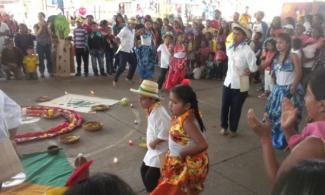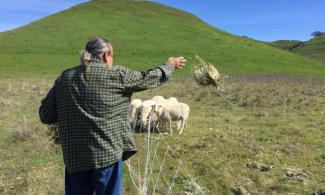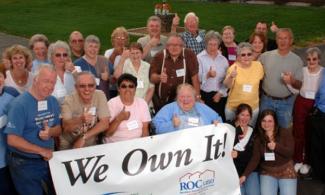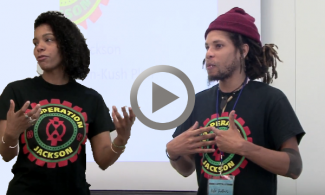Last summer, I was interviewed in Vienna, Austria by “Dr. Future,” i.e. Allan Lundell and his wife, Sun Marian McNamee-Lundell. We were joined in the conversation a couple of times by Franz Nahrada, who had brought us together here in his hotel. It was quite an interesting conversation about how our economy generates scarcity and about some possible alternatives, and I am sharing the audio file with you here. I’ll offer some comments on the interview now as I reflect on it over half a year later.
In this interview, there were two aspects of the solidarity economy that I especially highlighted, which were the Mondragon co-operatives and the MST (Movimento dos Trabalhadores Sem Terra), Landless Workers Movement in Brazil. Among the Mondragon co-ops, I mentioned Fagor which is now defunct, but which I had visited a year earlier – I knew from that time that it was facing a lot of struggle, and that other workers in coops that had formerly been part of the same larger cooperative had voluntarily decided to give up some of their wages in order to help out the Fagor workers, but I didn’t know that it was about to go bankrupt as I later learned from GEO. Yet, I continue to be impressed by the amount of solidarity and shared responsibility among the workers in the Mondragon co-operatives, and the extent to which they have built up institutional structures to make that solidarity work.
I found the reactions of my interviewers very interesting, since they had not heard about these businesses before. They were clearly surprised about the scope that co-operative ventures can take. In the middle of the interview, Al asked Franz Nahrada, co-owner with his sister of a hotel inherited from their parents, whether he would contemplate turning it into a co-operative – clearly expecting that the answer would be no. But Franz said that, if his employees would take over some of the responsibility along with ownership shares, he would be glad to share ownership! He’s certainly not your average hotel-owner, using his hotel as a base to bring together people with interesting ideas, and working in a Global Village Network to foster networking among people who are trying to build up small-scale sustainable communities. Knowing this, I wasn’t that surprised, and it’s good to remember that there are such “non-average” business owners out there who are looking for different paths!
Another point where both Al and Sun were surprised is when I mentioned that the Brazilian constitution states that landowners have an obligation to make use of their land, and if they don’t, others can occupy their land and claim it – as the MST has been doing. They immediately understood the logic of this argument, but the idea that ownership implies some kind of obligation really seems to go against an ingrained assumption in our capitalistic culture. It’s amazingly radical to say that an owner needs to do something in return for the state protecting a claim to property.
Al then raised the question whether migrant workers in California should be made owners of the land – and I agreed. I was a bit taken aback when he replied that they don’t work on the same land continuously, and that all this agriculture will soon be done by robots anyway. Of course, mechanization is a way to reduce the need for excessive and especially repetitive labor. It’s a commonplace that we can have machines instead of slaves and that this buys a certain kind of freedom. But on the other hand I am convinced that sustainable farming requires close attention to the land – not just by some high-tech GPS devices that are supposed to tell the farmer where to apply how much fertilizer, but by actual humans familiar with the land!
A vision that comes to my mind regarding California agriculture is cooperatively owned plantations, each producing a diversity of different crops on different fields. In this way they could even out labor requirements throughout the year, and the worker-owners would not need to migrate all the time. But I haven’t talked with any migrant laborers in California, and won’t presume to say whether that would be a solution for them.
A footnote to the interview: I mentioned a book by Marjorie Kelly, in which she discusses the John Lewis Partnership in the UK, but I couldn’t remember the book title at the time. The book is Owning Our Future: The Emerging Ownership Revolution (San Francisco: Berrett-Koehler Publishers, 2012).
At one point in the interview, I talked as if I were in Berlin rather than Vienna – because I was looking forward to attending a conference that was about to happen in Berlin! That conference may be the subject of an upcoming blog!





Add new comment